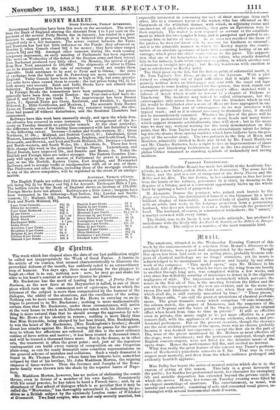t Quarto.
'The week which has elapsed since the date of our last publication might be called not inappropriately the Week of Good Farces. A famine in the article of via comica, that seemed characteristically to illustrate the proverbial dulness of the month, has suddenly ceded to an extraordinary crop of humour. Ten days ago, there was nothing for the playgoer to laugh at—that is to say, nothing new : now, he may go and shake his sides to his heart's content at whatever theatre he pleases.
Mr. Buckstone has the merit of, loading the way. A Pretty Piece of Business, as the new farce at the Haymarket is called, is one of those piees which turn on the commonest sort of equivoque, but in which the triteness of the subject is more than compensated by the humour of the dialogue, the oddity of the situations, and the excellence of the acting. Nothing can be more common than for Mr. Howe in carrying on an in- trigue to pretend to be Mr. Buckstone; nothing is more mathematically certain than that Mr. Buckstone, under these circumstances, will arrive at the very house in which such liberties are taken with his identity ; no- thing is more natural than that he should avenge the aggression by rob- bing Mr. Howe of his identity in return; nothing is more likely than that Miss Reynolds, being charged by her best friend, Mrs. Buckingham, to Win the heart of Mr. Buokstone, (Mrs. Buckingham's brother,) should direct her attacks against Mr. Howe, seeing that he passes for the gentle- man to whom her affections are referred. All this is the most ordinary outline of farce action and motive ; it has been treated a thousand times, and will be treated a thousand times more. But in the drama, as in other arts, the treatment is often the great point ; and, just ai the ingenious contrapuntist can build every variety of composition on one Gregorian plain-song, so can the ready dramatist raise countless representations on one general scheme of mistakes and collisions. Such a ready dramatist is found in Mr. Thomas Morton ; whose fame has hitherto been somewhat eclipsed by that of his brother, Mr. John Maddison Morton, the reigning emperor sf farce-writers. Thus the Jeromes and Josephs of the Bona- Parte family were thrown into the shade by the superior lustre of Napo- leon.
Mr. Maddison Morton, however, has no notion of abdicating the comic throne, even in favour Of a member of his own family. Consistently with his usual practice, he has taken in hand a French farce ; and, by an abundance of that school of dialogue which is so peculiar that it may be called the "Mortonian,' has thoroughly naturalized it, indicating its po- sition as a British subject by the extremely Landon name of Whitebait at Greenwich. Two fond couples, who are not only secretly married, but especially interested in concealing the Met -ot-thair _marriage from each other, live in a constant terror of the waiter, who- has officiated as the Ganymede at the whitebait dinner, with whieh, in-adjoining rooms and unconscious of each other's proximity, they gave an-Epicurean tone to their nuptials. The waiter is now engaged as servant at the establish- ment to which the two couples belong, and is pampered and petted to en- courage him in habits of seer, cy. As he does not recollect the faces of the parties, he does not know now to account for kindness so unusual ; and it is the admirable manner in whirl, iIr. Keeley depicts the combi- nation of an absolute ignorance of biers with a cunning feeling of an 'ad- vantage, which gives the chief comic colour to the piece. The supposi- tion that one of his benefactors is his eeii father, who cruelly deserted him in his infancy, leads tean explosion 'ii pathos, in which another sort of humour is brought into play ; but Keeley boisterous with emotion is just as satisfactory as Keeley quiet. The third piece on the list, but the first in point of substantial merit, is Mr. Tom Taylor's Nice Firm, produ. ed at the Lyceum. With a plot formed so completely out of legal diffieulties that it might be appro- priately written down on brief-paper and sent with the usual red tape adornments to some leading counsel for his opinion, this work stands out a complete picture of an ill-comlueted attorney's office, sketched with a fulness of detail which would do bohour to a chapter of Dickens or Thackeray. The incidents may indeed be called extravagant, but the extravagance only arises from the fact that the blunders which in real life would be distributed over a score of Aims are here aggregated in one luckless house. This sort of extravagance in no way interferes with typical truth ; and as it is almost nem-ssary to dramatic force, it should not be inconsiderately censured. Whether the jokes of the piece will be found too professional for that power of many heads and many trades which support dramatic establishments, lime will show ; but in the mean time we may say, without waiting for the tardy demonstration on this point, that Mr. Tom Taylor bus shown an extraordinary talent for bring- ing into the drama those special realities which have hitherto been the pro- perty of the novelist alone. The two partners in the firm of Moon and Messiter, admirably clothed in flesh and blobd by Mr. Frank Matthews and Mr. Charles Mathews, have a right to live as impersonations of sheer stupidity and blundering recklessness, just as the two statues of Theo- philua Cibber remained as standing symbols of melancholy and raving madness.


































 Previous page
Previous page